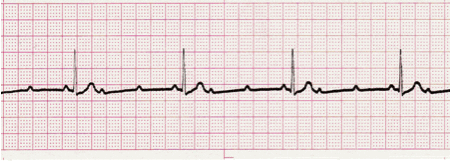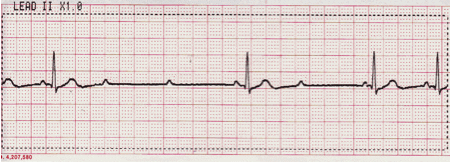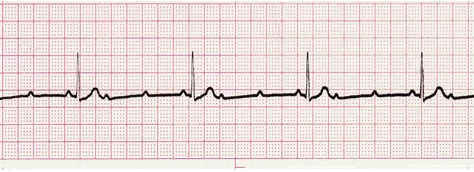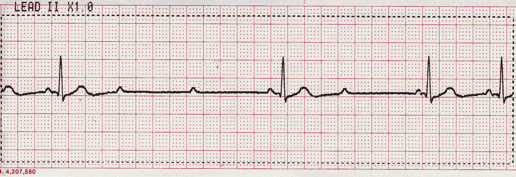Second Degree Heart Block Type II - Heart Blocks
Description
- The hallmark of this dysrhythmia is a constant P-R interval with missing QRS complexes.
- This dysrhythmia may present in a couple of different ways.
- A. QRS complexes occurring in a specific pattern in a ratio with the P waves. This is often referred to as 2:1 or 3:1 block depending upon the ratio of P waves to each QRS complex.
- B. QRS complexes occur in a more unstable, unpredictable manner.
- Either presentation requires immediate reporting due to its potential for conversion to Third Degree (Complete) Heart Block.

B.

Practice Strip

Analyze this tracing using the five steps of rhythm analysis.
Show Answer
- Rhythm: Atria and Ventricles - Regular
- Rate: Atria – 125, Ventricles - 41
- P Wave: Upright
- PR interval: 0.14 sec
- QRS: 0.06
- Interpretation: Second Degree Heart Block Type II, 3:1
Practice Strip #2

Analyze this tracing using the five steps of rhythm analysis.
Show Answer
- Rhythm: A – Regular, V - Irregular
- Rate: Atria – 68, Ventricles - 40
- P Wave: Upright
- PR interval: 0.16 sec
- QRS: 0.08
- Interpretation: Second Degree Heart Block Type II
Authors and Sources
Authors and Reviewers
- EKG heart rhythm modules: Thomas O'Brien.
- EKG monitor simulation developer: Steve Collmann
-
12 Lead Course: Dr. Michael Mazzini, MD.
- Spanish language EKG: Breena R. Taira, MD, MPH
- Medical review: Dr. Jonathan Keroes, MD
- Medical review: Dr. Pedro Azevedo, MD, Cardiology
- Last Update: 11/8/2021
Sources
-
Electrocardiography for Healthcare Professionals, 5th Edition
Kathryn Booth and Thomas O'Brien
ISBN10: 1260064778, ISBN13: 9781260064773
McGraw Hill, 2019 -
Rapid Interpretation of EKG's, Sixth Edition
Dale Dublin
Cover Publishing Company -
12 Lead EKG for Nurses: Simple Steps to Interpret Rhythms, Arrhythmias, Blocks, Hypertrophy, Infarcts, & Cardiac Drugs
Aaron Reed
Create Space Independent Publishing -
Heart Sounds and Murmurs: A Practical Guide with Audio CD-ROM 3rd Edition
Elsevier-Health Sciences Division
Barbara A. Erickson, PhD, RN, CCRN -
The Virtual Cardiac Patient: A Multimedia Guide to Heart Sounds, Murmurs, EKG
Jonathan Keroes, David Lieberman
Publisher: Lippincott Williams & Wilkin)
ISBN-10: 0781784425; ISBN-13: 978-0781784429 - Project Semilla, UCLA Emergency Medicine, EKG Training Breena R. Taira, MD, MPH